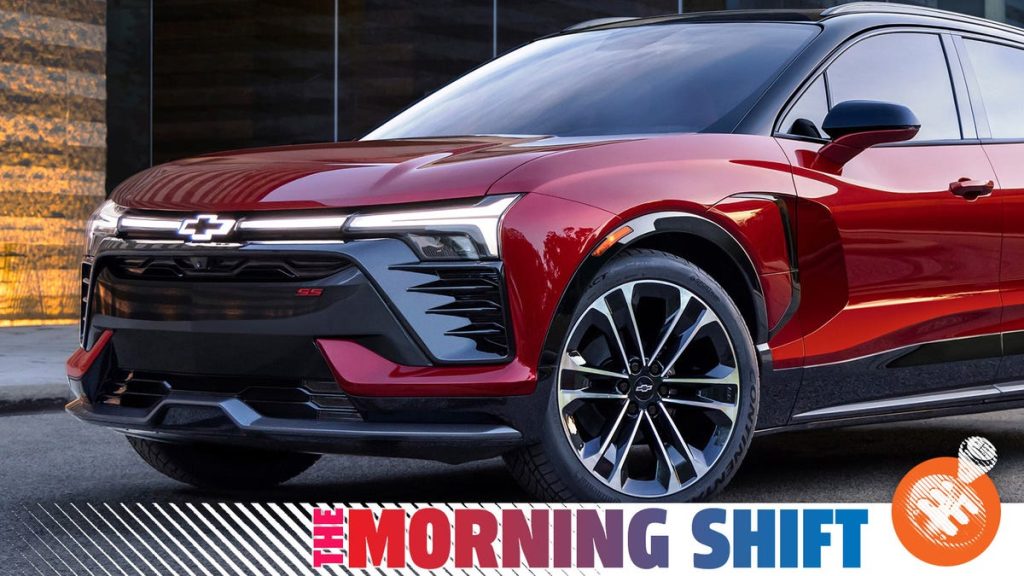GM Reclaims Top US Sales From Toyota After Losing 90-Year Streak

2024 Chevrolet Blazer EVImage: General Motors
The General has stolen the number one spot back from Toyota, Stellantis is anticipating another slow year of production in Italy and Jaguar has a new plan for the future: be Range Rover. All that and more in this Tuesday edition of The Morning Shift for July 5, 2022
1st Gear: GM’s Back on Top — For Now
Toyota sold more cars globally last year than any other manufacturer, edging out Volkswagen for the title for the first time in five years. It also outsold General Motors here in the U.S. — the first time anyone had done that since 1931 and the first time a foreign automaker had ever claimed the top spot. Now the second quarter 2022 numbers are in, and GM is back on top here at home, if only just. From Automotive News:
GM outsold Toyota by more than 47,000 vehicles in the second quarter, according to the Automotive News Research & Data Center. GM delivered 578,507 vehicles, while Toyota sold 531,105.
“Whatever we are wholesaling, [dealers] are retailing,” said Jack Hollis, the new executive vice president of sales for Toyota Motor North America. “Right now, we are not seeing any softening.”
Overall, U.S. auto sales fell 25 percent in the second quarter for the 10 automakers that reported as of press time Friday, July 1. Ford Motor Co., Volvo, Mercedes-Benz and Jaguar Land Rover had not yet reported second-quarter sales and were expected to report this week.
Toyota weathered the supply chain headwinds better than anyone, which is likely why it fared better than GM over the entirety of 2021. However, those pre-pandemic preparations could only last so long, and Toyota is certainly not immune. Everyone is going through it:
Automakers’ parts supplies have ebbed and flowed at different times during the chip crisis, said Stephanie Brinley, principal automotive analyst at S&P Global Mobility. “The situation is so fluid right now that on a month, you can say one OEM had more chips than the other. But that’s too small of a snapshot to understand how well automakers are getting through the process,” she said.
So, congratulations to GM, who has, for the moment anyway, retaken its familiar position as America’s sales leader. Unfortunately, the streak is over, and there won’t be any asterisk in the record books owing to the chip shortage.
2nd Gear: Stellantis Slows in Italy
The entity that comprises Chrysler, Dodge, Jeep, Ram, Fiat, Alfa Romeo, Maserati, Lancia, Peugeot, Citroën, Opel and Vauxhall has recorded year-over-year declines in production in Italy over the last four years. 2022 isn’t likely to be any different, according to its union staff. From Reuters:
A global crunch in semiconductor supply could cost Stellantis up to 220,000 vehicles this year in terms of lost output in Italy, the FIM CISL union said, adding this would mark the fifth year in a row of declining production in the country.
FIM CISL said in its periodic report on the group’s production in Italy that Stellantis produced 351,890 vehicles in the first half of this year, almost 14% less than in the same period last year, with the key Melfi plant and the Sevel van-making facility being the most affected sites.
Using data for the first half of the year and potential full-year production based on orders booked, the union estimates Stellantis could lose between 200,000-220,000 vehicles in 2022, said Ferdinando Uliano, the head of the FIM CISL union.
This, therefore, is a problem that predates the chip shortage, though is certainly made worse because of it. “It’s as if one of [Stellantis’] large plants stopped for a year,” the union’s chief said.
Four out of every 10 cars Stellantis makes in Italy comes from the Melfi plant, where the Jeep Renegade and Fiat 500X are made. Melfi is also where Stellantis expects to churn out four different battery-electric crossovers across its various brands in 2024, and where the company had to shut down production for a week in June because the flow of silicon had dried up so much.
3rd Gear: Volkswagen Owns Europcar Now
Europcar, a rental car agency you’re not likely to encounter if you live in the States but one you’ll definitely recognize while on vacation, now effectively belongs to Volkswagen. The automaker will claim 67 percent of the company after leading a consortium to buy up almost 94 percent of its shares, per Reuters.
Volkswagen briefly owned Europcar before, in the late ’90s and early aughts. This time it’ll leverage the brand to float alternative car use opportunities, as Automotive News Europe reported this morning:
VW will position Europcar at the center of its mobility services strategy, which will encompass traditional rentals, car-sharing, subscriptions, leasing — and autonomous vehicles after 2025.
Volkswagen Financial Services will host the new central platform, although all VW Group brands will have their own services tailored to their customers’ needs, the automaker said.
Christian Dahlheim, the head of VW Financial Services, said diversifying mobility services was a response to changing customer habits.
“People increasingly want to use their vehicles and not buy them, which is a trend we have seen over the last decades,” he said in a news conference on Tuesday.
VW isn’t the only manufacturer trying to win at the subscription game, of course. BMW and Mercedes-Benz have even joined forces for similar reasons. The difference with Europcar is that Volkswagen is starting with an entity that can fall back on traditional car renting, which is already profitable, ensuring it has the cash and scale to experiment with different terms:
Dahlheim said an expanded Europcar could succeed where others have not because it is based on the “fundamentally profitable” traditional car rental.
“If you look at sharing and subscription business in isolation, which we have done in the past, let’s be honest, no one has managed to do that profitably in a reasonable manner,” he said.
“The rental car business is a profitable business,” he added. “Sharing and subscription are fundamentally renting a car, so we believe if you have one fleet that you offer as rentals, sharing or subscriptions, depending on customer needs, that is a successful business model.”
It may even one day expand into the States, where I expect a focus group will recommend a name change.
4th Gear: Nissan Has Another Truck Recall
About a week ago we learned Nissan was recalling more than 360,000 Pathfinders around the world, sold between 2013 and 2016, for defective hood latches. Unfortunately, the brand’s other workhorses have a recall of their own, which emerged late last week but we didn’t get around to covering. The Titan — which probably isn’t long for this world anyway — and Frontier have a roll-away problem, per Consumer Reports last week:
Nissan is recalling over 180,000 Frontier and Titan pickup trucks from the 2020 through 2022 model years as the trucks could roll away even if the shift lever is in Park. So far, the automaker says it is aware of four reports of injuries.
The automaker is currently developing a fix for the problem, but in the meantime, Nissan says that owners should use the parking brake every time they park their vehicles. Once a remedy is available, owners will be able to take their trucks to a Nissan dealer for a free repair.
If you have a new or new-ish Nissan pickup, get in the habit of using that parking brake. If you don’t but still want one, maybe this is another reason to seek out an old Frontier, rather than trying to snap up one of those admittedly handsome but old-at-heart newer models that just came out. They say they never die.
5th Gear: Jaguar Has Plans
For all of Jaguar’s troubles, I never thought we’d see a day where the brand appeared to have less of a direction forward than Lotus. And yet, here we are. Supposedly, Jaguar’s next era will be defined by electric SUVs. In other words, it’ll become just like its sister Range Rover, but swoopier. From Autocar:
Jaguar is planning a trio of “jaw-dropping” electric sports crossovers to burst through the £100,000 barrier and take the brand into Bentley territory from 2025.
The new two-tier, three-model line-up promises to dramatically recast Jaguar as a 50,000-60,000-per-year manufacturer of exclusive, electric, aluminium-rich cars.
These will be based on a single platform, named Panthera, utilise closely related mechanical packages and be made in Solihull.
When he became Jaguar Land Rover CEO two years ago, Thierry Bolloré made no secret of his plan to mirror the Range Rover ethos – and success – in a newly configured Jaguar line-up. Within months, the Jaguar design team had been heavily reshaped under Gerry McGovern, the Land Rover design chief who was elevated to the role of group creative director, but since then details have been extremely sketchy.
It’s legitimately tragic how Jaguar had that big rebirth in the late aughts and early 2010s where it really seemed like it’d finally figured itself out and escaped the doldrums of old luxury, only to squander that enthusiasm away again. Whatever comes next, I just hope it looks as weird as the I-Pace, though maybe a better name would help.
Reverse: Speaking of Old Luxury
It was on this day in 1990 that the original Lexus LS400 went on sale in the U.K., according to 365 Days of Motoring. This gives me an excuse to embed one of Lexus’ fever dream television ads from the era. Why are all the suited old white people standing atop the Leaning Tower of Pisa? To supply a belabored visual metaphor, of course!
Neutral: The G[V]OAT
Renault Espace F1 amazing sound
Everyone’s still talking about that new Supervan, which looks rad. But the Espace F1 will always be the people mover to beat, in my heart.




